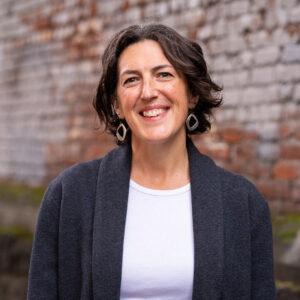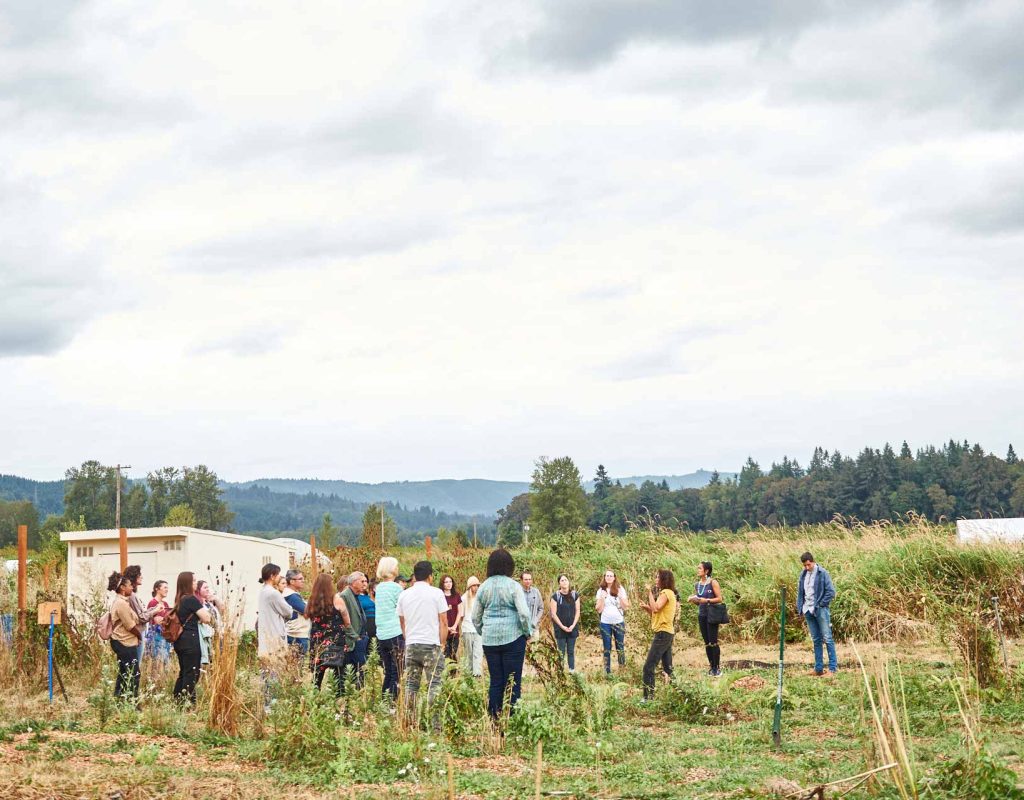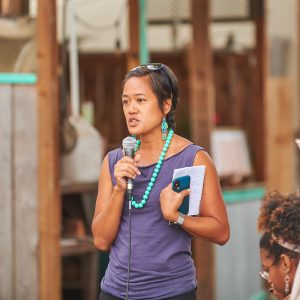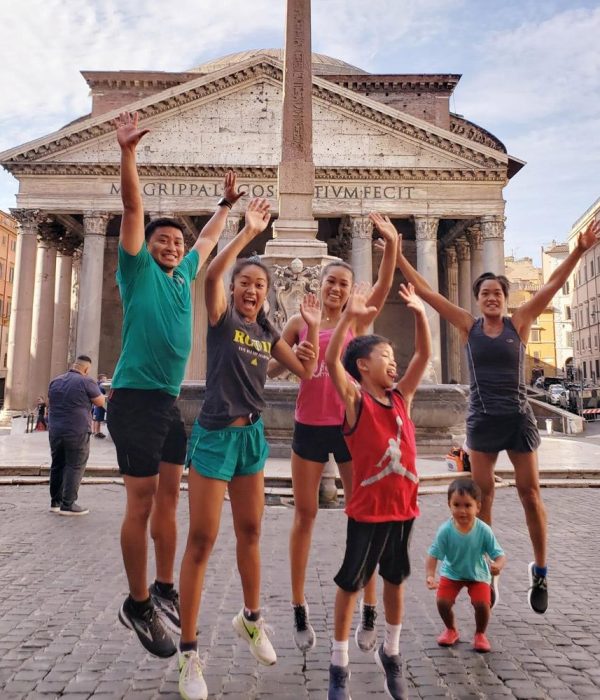
Senior Communications Director
Portrait of Olivia M. Rebanal. Photo credit: Kim Nguyen
Recently, Olivia M. Rebanal was hired as Ecotrust’s first Chief Impact Officer. Working across teams, Olivia has been busy coordinating energies toward our newly-minted Strategic Plan, and building equity-centered processes to deepen the collective impact of Ecotrust’s work across the region.
Here, Olivia speaks with Communications Director Doe Hatfield on her background in social finance and equitable food systems, and how those experiences inform the opportunities she is excited to explore in her role.
I lived in Portland for almost a decade in the 2000s. Fifty percent of my offspring were born there, my two middle ones, so I have a soft spot in my heart for Portland. And during my time there, I observed Ecotrust mostly in the context of Farm to School. I saw Ecotrust as an early adopter and leader in that movement. It was my impression that it bore a presence and legacy.
When I was working deeply in equitable food systems work at my previous organization, I came across the Director of Food Equity job posting. I noted that that role does not exist in very many places. And that’s why later I was super excited to meet Jamese [Kwele, who was hired for that role]. Through her, I met Jeremy [Barnicle] and Nathan [Kadish], and we found a lot of alignment. The work that I was doing in my portfolio was exciting to them. And, the work that they were talking about at Ecotrust was exciting to me. I think it was a mutual attraction and appreciation for one another’s work. From those conversations, I eventually joined the Ecotrust Investments (EI) board in the spring of 2020.
The job description for my current position, which was newly-created, was written and circulated in mid-2020. It took a while to get through the application process in the final months of that year, but I enjoyed every step of the way because it allowed me to get a greater level of depth and familiarity with the people and the organization and the work. I tried to really listen and hear for alignment, all the things that would make it feel like a good next home to me.
The use of the term racial equity and all the language that is related to that concept are signs of alignment to me. I was aligned with the very transparent and open process that was outlined for applying to a position. I was aligned with the specificity around race and justice that I was seeing Ecotrust use with increasing frequency.
To reckon with the concepts of institutionalized racism within our financial and food systems, there’s a level of literacy and fluency that is the precursor. And when an organization has that, I take note because I realize that they are in a part of the journey that is beyond just understanding the problem, and probably far enough along the learning journey to be able to then operationalize interventions.

Ecotrust staff and board visit Wapato Island Farm. Photo credit: Jason Hill
To back up a good 20 years, my master’s [degree] is in Public Administration and Finance, and it was during grad school that I worked for my first community development financial institution (CDFI). After graduating, I was doing a lot of work with underwriting—for a little while, I was a business lender for Prosper Portland—analyzing an enterprise’s ability to repay, and then making a recommendation to get capital out the door.
Over time, I had observed enough experiences where the outcomes were clearly disparate. Working with Latinx business owners and Black business owners was different, and getting them approved was different. Many times these entrepreneurs don’t have as much cash to put in as equity into projects. They lack traditional networks and relationships. Usually, white entrepreneurs have no problem getting into front doors of financial institutions, or—if they show up ill-prepared—they have networks to help them prepare so that they present well. All of these things are not always present for entrepreneurs of color.
“
I see my role as helping to institutionalize a more consistent, explicit approach to equity across all the programming.
In one of my roles as a small business lender, I was working up and down the West Coast with a lot of independent grocers, and it put me in touch with food manufacturers. That is what gave me the “nitty gritty” food system finance experience.
I transitioned to another organization that was the administrator of a California statewide food initiative that involved over a dozen investors pooling $125 million. I had the role of overseeing all of our loan programs, this food initiative among them. At the time, we had many different programs: including a pension-funded initiative to support charter schools and a whole category of loan programs focused on food access and food systems.
I began to notice that the investors wanted one thing, and the community wanted another. Food enterprises from Boyle Heights or West Oakland needed a certain type of financing and support that the investors had not considered because they were very restrictive. So we began to hone in on this disconnect between the community need and the available capital.
We used experience from our experiences in the California initiative and moved into developing, designing, and implementing an initiative in Michigan. I am very proud of what the Michigan fund became because when we began, we didn’t exactly know the finer points of the program that we would offer. We knew that we wanted to create access to food in places where it was inaccessible thanks to the impacts of institutional racism. But, the initiative was also about creating economic opportunity in places that have long been exploited, extracted from, and not been allowed to participate in the food economy.
We formed a collaborative across eight or nine different types of organizations that had different specialties—different kinds of financial products, different kinds of technical assistance—and created a common objective and a pathway to achieve it together.
“
One area where I see a lot of opportunity is consolidation, collaboration, and movement toward collective impact.
I always felt like the initiative in Michigan was sort of a Petri dish of learnings that could be applied to many other sectors and many other bodies of work. What I was focused on doing immediately before I came to Ecotrust was trying to implement those lessons from a specific initiative up to an organizational level.
Here at Ecotrust, I’ve observed that there is a line between internal and external equity. For example, there’s the Equity Working Group and Jamese’s role [as Vice President of Organizational and Food Systems Equity] that is very people-focused, building a culture of inclusion within the organization. We have done great work explicitly centering race internally, building a culture of inclusion within the organization and creating pathways to institutional equity through transparent talent management across all staff. We also have the opportunity to explicitly center race externally in our programmatic initiatives, tracking outcomes by racial identities as well as employing processes that are intentionally inclusive when designing new projects. I see my role as helping to institutionalize a more consistent, explicit approach to equity across all the programming.
I am still learning a lot. But what I do want is for the organization to feel a trajectory for how we can demonstrate how all of our projects are driving toward some common goals. What are the things that draw us together? Where is our commonality across our programs and initiatives?
This will also, in my view, enhance the way that we work together and collaborate within our organization. I think “enhance” is the right word, because we are already doing great things. But, if we can consolidate our strengths, the impact can be greater. So that is one area where I see a lot of opportunity—consolidation and collaboration—and movement toward collective impact.

“
I lean into a very collaborative style. I like to hear from everyone. … it also feels natural and right to lead this way. This approach is really intertwined with my lived experience as a woman of color.
I think the other thing is the definition of impact. I would love for all of us to feel really empowered about what that means. Impact needs to be specific and explicit. For us at Ecotrust, “impact” must have a direct tie to our three E’s: equity, the environment, and economy. I’ve been working with a small group here at Ecotrust to develop a “Three E Scorecard” that really gets specific about articulating how we determine whether a project that we’re asked to participate in advances our goals in the economy, in equity, and in the environment.
One thing I find attractive about Ecotrust is that it has a podium that we can leverage for change. It has a strong, positive reputation where we can be of influence. As CIO, I want to leverage that.
I have learned that I lean into a very collaborative style. I like to hear from everyone. I might have leaned into this methodology because I have been an insecure leader. When called upon to make a decision, I might have had a viewpoint and a pathway forward, but I did not feel confident that I could express it or implement it without having validation from others. And it also feels natural and right to lead this way. This approach is really matrixed and intertwined with my lived experience as a woman of color. It’s a protective measure that I used to seek validation when I felt I would be dismissed. And I also believe that the product is better when we do it together. I think there is a duality.
I continue to exercise this methodology and hone it. There is this fine balance between inclusion and co-creation and needing to make a decision or apply a level of finite authority. It’s something that I’ll continue to practice and learn about myself. And I feel like Ecotrust really values this “both and” [way of thinking].

Olivia and her family on holiday in Rome. Photo courtesy of Olivia M. Rebanal
We moved to Portland almost sight unseen, and I was seven months pregnant. We had been living in New York City and Atlanta before, and when we flew in, we saw nothing but trees. I turned to my partner and said, “I thought you said this was a city. There’s nothing but trees here!”
My partner and I identify as Filipino, born and raised in the States, and it was hard from that perspective to be in such a white place. We always felt like our time was a little limited in Portland because of that.
It’s an interesting contrast being in the Bay Area [now]. In Portland, we know very few Filipino families, our social circle in the Bay is pretty exclusively Filipino. So it’s different, and I love it all. Even though we left Portland almost 10 years ago, we’re still Trailblazer fans (#ripcity), and we are still very close with our beloved Portland community.

PARTNER WEBSITE